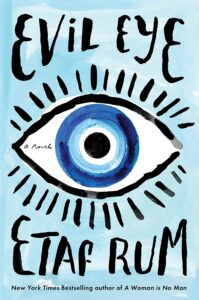
On Literary Empathy and the Performative Reading of Palestinian Authors
Etaf Rum Considers Reading and Writing During Times of Crisis
The literary community holds onto empathy as a dear goal while navigating the complexities of the human experience through the eyes of characters from diverse backgrounds. Readers worldwide have long celebrated the promise of empathy as a conduit for profound understanding, and reading from diverse sources is itself celebrated as an unambiguous moral good.
Yet I find an unsettling paradox has emerged, becoming ever more evident as Americans witness the ongoing genocide in Gaza—why does the empathy we cultivate through literature often remain a performative gesture, confined to the realm of fiction and failing to take root in the real world?
As a child in Brooklyn, New York, I was raised by Palestinian immigrants, born into a narrative of displacement, oppression, and marginalization—a narrative that became the very fabric of my identity. Growing up as a young Palestinian-American woman in post-9/11 America was profoundly isolating. I learned early that my heritage was laden with controversy, and saw that the mere mention of “Palestine” often ignited strong reactions, ranging from claims that Palestine didn’t exist—and by extension neither did I—to being branded as a terrorist.
I tried to make sense of it through the stories passed down from my grandparents, stories of dispossession and suffering during the Nakba, the traumatic and brutal expulsion of Palestinians from their homeland in 1948.
The weight of Palestinian history, and the trauma of the Nakba, is not a distant memory; it has seeped into our homes and community, creating a sense of powerlessness and fraying the fabric of our relationships: men against women, parents against children, tradition versus freedom. The weight of oppression was twofold: the external oppression imposed on Palestinians by Israel and the Western world, and the internal oppression within our own community, an oppression that was less visible but equally potent, where trauma left its scars on our families—the struggle of Palestinians against each other, each grappling with the legacy of displacement and the fight for survival even, or perhaps especially, in exile.
I wanted to create a space for Palestinians on the literary bookshelf and to share stories that might otherwise remain untold or ignored.
In the midst of this coming of age, books were my refuge. They were my companions during those lonely times when I felt invisible as a Palestinian woman. Although there were few literary works that portrayed the Palestinian experience, I was drawn to writers of color whose work mirrored the powerlessness and isolation I felt. Within those pages, I was able to uncover the roots of my loneliness and disconnection, and for the first time recognize how forces of oppression interacted on my life. Books became a bridge to a world beyond my own, broadening the scope of my understanding of life beyond the confines of my own traumatized household.
I found particular solace in the work of Black writers like Toni Morrison, Maya Angelou, and Audre Lorde. The emotions, struggles, and experiences they described in their brave and unflinching narratives connected me with the politics of liberation. I was surprised to find so much I now can recognize as part of the universal human experience in the stories of these women whose backgrounds were so different from my own. Reading their books made me feel less alone, less alien in a world that often saw me as “other.” It gave me insight into common struggles, and inspired me to take up causes I came to see as linked to my own.
One reader even made a video of herself throwing my latest novel, Evil Eye, which she claimed to have loved, into the trash.
The voices of these beloved writers gave me courage to set about that would shed light on the Palestinian-American experience. I wanted to create a space for Palestinians on the literary bookshelf and to share stories that might otherwise remain untold or ignored. I aimed to do for readers what Toni Morrison and Maya Angelou had done for me—to awaken their understanding of a voiceless community and foster empathy for Palestinians through the power of storytelling.
For many readers, my novels have done just that. I’ve seen people of all different backgrounds celebrate my books, which explore the intergenerational trauma within the Palestinian diaspora community. I was deeply moved by hearing how my stories resonated with them, introducing them to a world they might not have known. The empathy they expressed for Palestinians was evident in the messages I received thanking me for sharing these stories.
However, in recent weeks, I’ve been bombarded with messages from readers who were shocked and furious to learn of my unwavering support for the Palestinian cause. Some readers aggressively demanded denouncement or retraction of support from people who have promoted my books; others called me a terrorist for standing up for Palestinians; one reader even made a video of herself throwing my latest novel, Evil Eye, which she claimed to have loved, into the trash. These reactions prompt an important question: What had initially drawn them to my Palestinian novels, and what had they learned from reading our stories?
True empathy is impartial and unburdened by prejudice, and pretending otherwise only perpetuates bias.
My novels directly address the enduring trauma inflicted upon the Palestinian people by the Israeli occupation, a trauma that persists through generations and causes suffering to those living under occupation and in exile. Were they unable to grasp that? Were these supposedly empathetic readers drawn to the rich tapestry of Palestinian culture, but then unwilling to reconsider their preconceived notions? Or did they approach my novels as mere entertainment, failing to truly engage with the underlying narratives? To fully see and understand our struggles?
The genuine astonishment many readers experienced when learning about my support for Palestine exposes a troubling reality—the prevalence of performative empathy within the reading community. There is a clear disparity between the empathy they felt for my fictional characters and their ability to apply it to the real-life humans suffering in Palestine.
I was disheartened to witness how many readers were merely performing their empathy, feeling self-congratulatory for reading the work of a marginalized author but still refusing to recognize the humanity of her people. True empathy is impartial and unburdened by prejudice, and pretending otherwise only perpetuates bias. This dualism, where one can hide their biases while feigning empathy, reflects the complex nature of our society—and reminds us that we still have more work to do.
The ongoing crisis in Gaza exemplifies the urgency of this issue. The lack of Palestinian representation in literature perpetuates the silencing of Palestinian voices, contributing to a long history of dismissing the narratives of people of color, women, queer people, and other marginalized groups. Literature can be a powerful tool of political awakening and I’m proud that my books have ignited awareness of the Palestinian cause for many readers. But awareness alone is not enough. If you can recognize our humanity in the pages of fiction, do not leave your empathy between the covers. Bring it into action after you close our books. There are real-world crises that demand our attention.
________________________

Etaf Rum’s latest novel, Evil Eye, is available from Harper.
Etaf Rum
Etaf Rum was born and raised in Brooklyn, New York, by Palestinian immigrants. She teaches college English literature in North Carolina, where she lives with her two children. She also runs the Instagram account @booksandbeans. A Woman Is No Man is her first novel. Her second novel, Evil Eye, is available now.



















